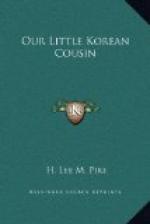The cabins along the country roads were a continual source of curiosity to Yung Pak. They were built of mud, without windows, and no door except a screen of cords. In nearly every doorway would be sitting a man, smoking a long-stemmed pipe, who looked with wide-open eyes at the unusual procession passing his house.
Of course all the men who lived in these country cabins were farmers, and Yung Pak liked to watch them as they worked in their fields, for to the city-bred boy this is always an entrancing sight. What seemed most curious to him was the fact that women were also at work in the fields. At his home the women of the family nearly always stayed in their own apartments, and when they did go out always went heavily veiled. These country women not only assisted in the farm work, but they had to do all the spinning and weaving for the family, in addition to usual household cares.
Wang Ken was able to tell Yung Pak much about country life, for, like most of the school-masters of Korea, he was himself a farmer’s son. He told how the Korean farmer lived a simple, patient life, while at the same time he was ignorant and superstitious. He believed in demons, spirits, and dragons, and in nearly every house were idols in honour of the imaginary deities.
Pigs and bulls are the chief animals on Korean farms. The latter are used as beasts of burden, though occasionally a more prosperous man may own a pony or a donkey. The farming tools are extremely rude and simple, thus necessitating the labour of several men or women where one man could do the work with good tools.
While travelling along Yung Pak met several hunters. They were not an uncommon sight on the streets of Seoul. When in the city they wore a rough felt conical hat and dark blue cotton robe. The garments were ugly in appearance and inconvenient. When the hunters were after game the robe was discarded, and its place taken by a short wadded jacket, its sleeves bound around the arms over wadded cuffs which reached from wrist to elbow. In a similar way the trousers were bound to the calf of the hunter’s leg, and light straw sandals over a long piece of cotton cloth were strapped to the feet and ankles. A huge string game-bag was slung over his back, and in an antelope’s horn or a crane’s bill bullets were carried. Powder was kept dry in a tortoise-shaped case of leather or oiled paper.
Yung Pak’s father would have been glad to have taken time for seeking game with some of these hunters, but the business of his trip prevented any unnecessary delay on the journey.
CHAPTER VIII.
THE MONASTERY AT CHANG-AN-SA
In the latter part of the afternoon of the fourth day, our travellers, weary and worn with the long journey, came in sight of Chang-an-sa, the Temple of Eternal Rest, one of the oldest monasteries of Korea, where hundreds of monks devoted their lives to the service of Buddha.




